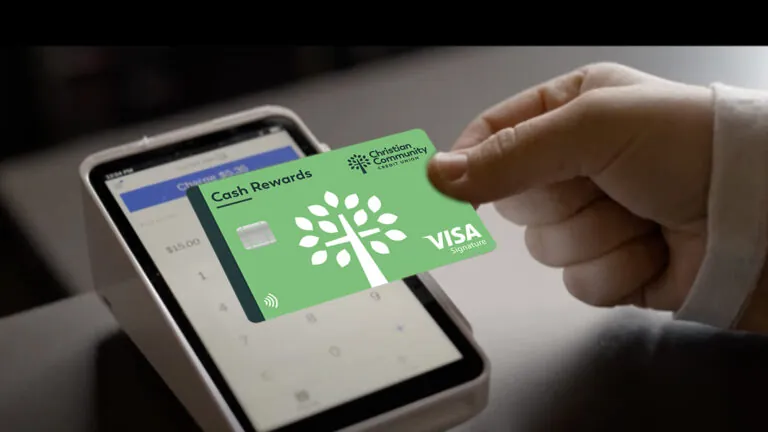Is it all mine? 3 Ways Biblical Stewardship Stands Out in a Secular World
November 16, 2023

God’s Word teaches us to live differently.
Even though we, of course, live in the world, the Bible reminds us that we are not of the world (John 17:16). To live in the world but not become of the world—to not be conformed to the “pattern of this world” (Romans 12:2)—is not always easy. It takes leaning into the transformative power of the Holy Spirit. And it involves daily putting off the old self and putting on the new self (Ephesians 4:22-24). Financially, that means putting off our old “consumer” self and putting on our new “steward” self.
For Christians, money management is a big deal. So big that God’s Word says more about money and material things than any other topic except the kingdom of heaven.
Here are three important ways that biblical stewardship differs from what the world teaches.
Entrusted, not entitled
Our world teaches us that we own our stuff. If we pay off our mortgage, we get the deed to our home. It’s ours. If we pay off our car, we get the title. It, too, is ours. And for all of the less expensive things we buy—from televisions to clothing—according to our culture, there’s no question; these things belong to us.
The Bible teaches something very different. God owns everything (Psalm 50:9-12). In the parable of the talents (Matthew 25:14-27), our intended relationships with God and material things are made very clear. Everything we have has been temporarily entrusted to us by God to be managed according to His principles and for His purposes.
That’s a completely different worldview than the one taught in our culture, and it has far-reaching ramifications. As managers of His resources, it’s essential that we understand His financial principles and the purposes He has in mind for all that He has entrusted to us.
Called to live generously
One of God’s purposes is especially clear: we are to live generously, freely giving to help the poor (Proverbs 19:17), spread the Gospel (Matthew 28:19-20), support those who teach His Word (Galatians 6:6), and help fund other Christ-centered ministries and needs that He puts on our hearts.
What does it mean to freely give? God’s Word gives us clear counsel, showing us that God started His Old Testament followers at a tithe (Leviticus 27:30), or 10% of their financial “increase” (Proverbs 3:9, KJV). That’s a practice Jesus affirmed (Matthew 23:23), but it’s also not intended as a stopping point, as the Bible talks about tithes and offerings. When C.S. Lewis considered this topic, he concluded that generosity should stretch us.
“I do not believe one can settle how much we ought to give. I am afraid the only safe rule is to give more than we can spare. In other words, if our expenditure on comforts, luxuries, amusements, etc, is up to the standard common among those with the same income as our own, we are probably giving away too little. If our charities do not at all pinch or hamper us, I should say they are too small. There ought to be things we should like to do and cannot do because our charitable expenditure excludes them.”
(Ephesians 2:10)
Those are challenging words that call us away from the life of comfort and pleasure so frequently promoted in our world and toward a life of contribution and impact taught in God’s Word.
Content, despite the pull of the culture
In 1916, in the midst of the era when the foundation of our consumer culture was being built, it was stunning how honest one marketer was in remarks at the Nashville Ad Club: “It is all very well to get the sales of things that people want to buy, but that is too small in volume. We must make people want many other things, in order to get a big increase in business.”[1]
Today, marketing has become a sophisticated science and very effective at making us “want many other things,” believing that we need them in order to be happy. It’s largely about fostering discontentedness. We can counter that through the conscious cultivation of contentment and there’s no better way than through the regular practice of gratitude. As the apostle Paul said, “Rejoice always, pray continually, give thanks in all circumstances, for this is God’s will for you in Christ Jesus.
There’s nothing wrong with buying things. The Bible even says that God gives us all things for our enjoyment (1 Timothy 6:17). Where we run into trouble is when we look to the things of this world for more than they can deliver.
Knowing our identity can’t be bought at the mall, that we are fully loved just as we are (1 John 3:1), no matter what brand of clothing we wear or where we can afford to go on vacation, is tremendously freeing. When we realize that our ultimate joy won’t be found here, but in heaven, we can enjoy the things of this world for what they are: good gifts from our loving heavenly Father, but not the basis of our greatest happiness or identity.
John Eldredge summed up very well what it looks like to live as a steward. He said we express our longing for God best when we “have the patience to enjoy what there is now to enjoy, while waiting with eager anticipation for the feast to come.”[2]
[1] The Overworked American, p. 119
[2] The Sacred Romance, p. 199
CCCU is proud to provide a Christian banking solution that is rooted in the principles of Biblical stewardship. Join thousands of Christians across the U.S. who have decided it’s time to bank with their Christian values at CCCU.
Matt Bell is the author of Trusted: Preparing Your Kids for a Lifetime of God-Honoring Money Management. He speaks at churches and conferences throughout the country and writes the MattAboutMoney blog.
This article should not be considered legal, tax, or financial advice. You may wish to consult a tax or financial advisor about your individual financial situation.



